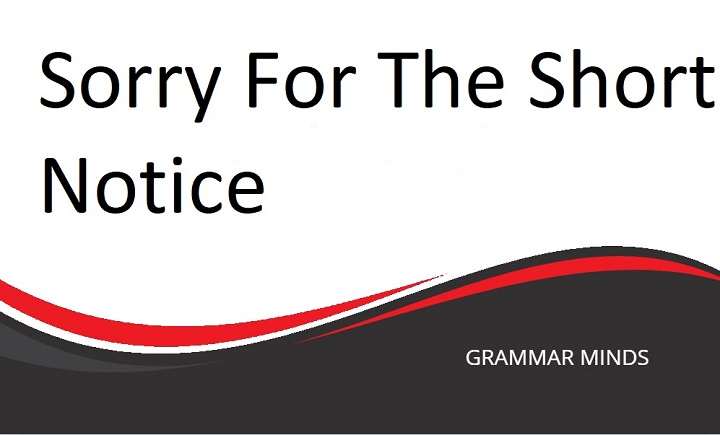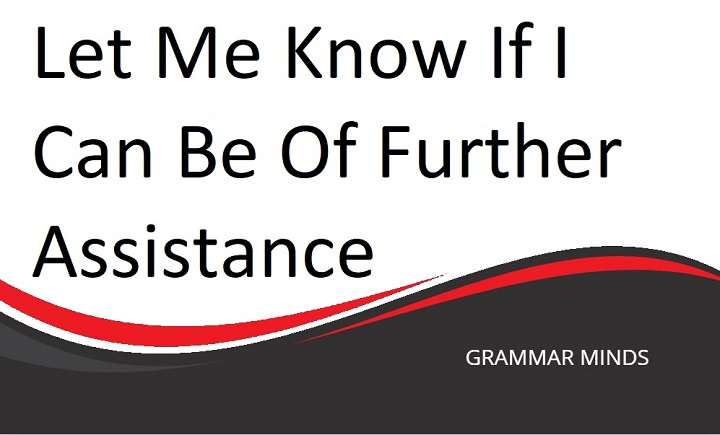Do you often find yourself using the phrase “sorry for the short notice” in emails, texts, or conversations? While this phrase is perfectly polite and commonly used, repeating it frequently can make your communication feel a bit routine. Whether you’re writing to colleagues, clients, or friends, using more varied language can help keep your messages fresh and engaging.
If you’re tired of always saying “sorry for the short notice” and want to expand your vocabulary, you’ve come to the right place! In this article, we’ll explore several alternative phrases you can use in different scenarios. Not only will these alternatives sound more dynamic, but they’ll also help you tailor your message to fit the context—whether it’s professional or casual.
Below, we’ve compiled a handy list of alternative phrases to replace “sorry for the short notice” and suggestions on how to use them.
Other Ways to Say “Sorry for the Short Notice”
- I apologize for the late notice
- Thank you for your flexibility
- I regret the urgency of this request
- I appreciate your understanding given the short timeline
- Due to unforeseen circumstances
- I hope this doesn’t cause any inconvenience
- Thank you for accommodating this last-minute change
- I understand this is a last-minute request
- I’m grateful for your quick attention to this matter
- Thank you for adjusting on such short notice
Let’s dive into each alternative, its usage, and how you can apply these in both professional and personal settings.
Key Notes
The phrase “sorry for the short notice” is grammatically correct and suitable for both formal and informal situations. However, it can sometimes feel repetitive or basic, especially when used frequently.
Here’s a breakdown of how to use these alternatives effectively in different contexts.
- Use “I apologize for the late notice” in more formal situations, such as emails or professional conversations.
- “Thank you for your flexibility” is a great informal alternative, especially when speaking to colleagues or friends.
- Phrases like “I regret the urgency of this request” and “I appreciate your understanding given the short timeline” are perfect for sensitive, professional communications.
Keep reading to discover how to use these phrases and when each one is appropriate.
I Apologize for the Late Notice
Usage:
If you’re looking for a more formal way to say “sorry for the short notice,” try using “I apologize for the late notice.” This alternative adds a touch of professionalism and is particularly useful in work environments, emails, or business meetings.
Example (in an email):
Dear Mr. Anderson,
I hope this email finds you well. I’m writing to inform you that we need to reschedule our meeting, and I apologize for the late notice. Please let me know your availability for a new time.
Best regards,
Sarah
Thank You for Your Flexibility
Usage:
A more informal alternative to “sorry for the short notice” is “thank you for your flexibility.” This phrase is appropriate when you’re communicating with someone you’re familiar with, such as friends, family, or close colleagues. It expresses gratitude while acknowledging the inconvenience of the short timeline.
Example (in conversation):
Hey Jamie,
Thanks for meeting up today! I know it was last minute, so thank you for your flexibility.
See you soon!
I Regret the Urgency of This Request
Usage:
When you need to sound more formal or convey a sense of seriousness, “I regret the urgency of this request” is an excellent option. It demonstrates that you understand the urgency and are considerate of the other person’s time, making it ideal for business or professional settings.
Example (in an email):
Dear Dr. Smith,
I regret the urgency of this request, but I would like to ask if you could review the attached document before tomorrow’s deadline. I greatly appreciate your attention to this matter on such short notice.
Sincerely,
John
I Appreciate Your Understanding Given the Short Timeline
Usage:
This phrase is a thoughtful way to replace “sorry for the short notice” in formal emails or requests. It emphasizes your appreciation for the recipient’s understanding while subtly acknowledging the limited time available.
Example (in an email):
Dear Ms. Carter,
I appreciate your understanding given the short timeline. If there are any questions or concerns about the requested revisions, please feel free to reach out.
Best regards,
Matthew
Due to Unforeseen Circumstances
Usage:
“Due to unforeseen circumstances” is a formal way to explain last-minute changes without placing the burden on the recipient. It’s especially useful in professional settings, such as when delivering unexpected news or explaining a sudden change of plans.
Example (in an announcement):
Dear Team,
Due to unforeseen circumstances, the presentation scheduled for Friday will need to be postponed. I will follow up with a new date as soon as possible. Apologies for any inconvenience this may cause.
Best,
Alex
I Hope This Doesn’t Cause Any Inconvenience
Usage:
This polite alternative works well in both professional and informal contexts. It’s a thoughtful way to acknowledge that the last-minute notice might affect the other person, without sounding overly formal or apologetic.
Example (in an email):
Hi Mark,
I hope this doesn’t cause any inconvenience, but I need to move our meeting to Thursday. Let me know if that works for you.
Thanks!
Emma
Thank You for Accommodating This Last-Minute Change
Usage:
When a change is unavoidable, and you need to show gratitude, this phrase works perfectly. It’s polite, appreciative, and appropriate for both professional and personal communication.
Example (in an email):
Hi Team,
Thank you for accommodating this last-minute change in schedule. I appreciate your prompt attention and cooperation.
Best regards,
Lauren
I Understand This Is a Last-Minute Request
Usage:
This phrase is ideal when you’re asking for a favor or assistance on short notice. It shows empathy and consideration for the other person’s time and can be used in both formal and informal settings.
Example (in conversation):
Hey Tom,
I understand this is a last-minute request, but would it be possible for you to send me the files before the end of the day? I’d really appreciate it!
Thanks,
Sophia
I’m Grateful for Your Quick Attention to This Matter
Usage:
This phrase works best in formal or semi-formal situations, especially when you need someone to act quickly. It expresses gratitude without directly apologizing for the short notice.
Example (in an email):
Dear Mr. Williams,
I’m grateful for your quick attention to this matter and look forward to your feedback at your earliest convenience.
Sincerely,
David
Thank You for Adjusting on Such Short Notice
Usage:
This is a polite and appreciative way to acknowledge the inconvenience caused by the short notice. It’s suitable for both professional emails and informal conversations.
Example (in an email):
Hi Rachel,
Thank you for adjusting on such short notice. I’ll send over the updated meeting time shortly.
Best,
Henry
Is It Correct to Say “Sorry for the Short Notice”?
Yes, “sorry for the short notice” is grammatically correct and widely used in both formal and informal settings. It’s a versatile phrase that works in various contexts, from professional emails to casual chats. However, as with any frequently used phrase, it can start to feel repetitive, which is why switching it up can enhance your communication style.
Here are some slight variations of the phrase you can also try:
- Sorry for the last-minute update
- Apologies for the short timeframe
- I apologize for the short warning
Also Read
10 Ways to Say “Have a Good Evening” and Diversify Your Conversations
In conclusion, while “sorry for the short notice” is perfectly acceptable in most situations, using alternative phrases can elevate your communication and add variety to your language. Whether you’re writing a formal email or texting a friend, the options listed above provide you with several ways to express your message more creatively. By adjusting your phrasing to fit the context, you’ll not only sound more polished but also show greater consideration for your recipient’s time and flexibility.







